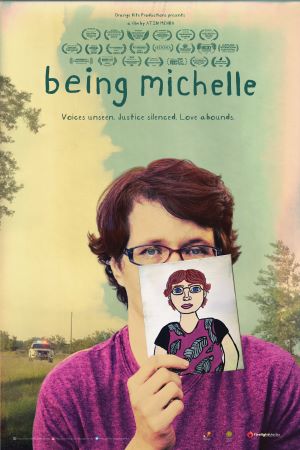
Being Michelle 2022
Distributed by Good Docs
Produced by Mae Thornton Mehra
Directed by Atin Mehra
Streaming, 80 mins
High School - General Adult
Criminal justice; Deaf culture; Disabilities
Date Entered: 03/06/2024
Reviewed by Sarah O'Shea, Access Services Librarian, SUNY OswegoWe often hear of the complex relationship that police and the justice system have with various communities. This film adds to that discussion, focusing on the lesser-discussed difficulties that the disabled community may experience when becoming involved with this system. Told in a series of interviews and unobtrusive filming, this film shares the story of Michelle Ricks, a deaf and disabled woman. Michelle finds herself embroiled in the justice system due to her disabilities, the effects of her abusive and neglectful past, a lack of understanding of her abilities and challenges, and a criminal justice system that is seemingly not equipped to fairly treat individuals with disabilities like Michelle’s.
This woeful inadequacy in supporting a person with disabilities is emphasized throughout the film in various ways. Family photos and movies as well as personal interviews with Michelle and others in her life paint the picture of her difficulties at home, in school, and eventually being trapped in the criminal justice system. Interviews with women who were incarcerated with Michelle highlight the failings of the institution, including handcuffing a woman who needs her hands to speak. Police body camera footage illustrates the lack of skills police have when handling Michelle and her disabilities during their altercations. The lack of interpreters peppers Michelle’s experience, leaving her with little understanding of things happening around her and to her.
The documentary does have some issues, including an unclear timeline. It’s difficult to follow when events happen, both in the description of Michelle’s past as well as experiences that happen during filming, as the filmmakers chose to hop around from different experiences, not necessarily in a linear fashion and with inconsistent labeling of scenes.
Despite this weakness, the film does do an excellent job of putting the viewer in Michelle’s and her caregiver’s shoes. Through the various components of the film, the viewer is alongside Michelle and her caregivers during the uphill battle they all face navigating the justice system. This documentary is recommended for high school and college students through a general adult audience.
Awards: Audience Award For Best Feature Documentary, Florida Film Festival; Best Documentary Feature, Ojai Film Festival; Grand Jury Award For Best Feature Documentary, Awareness Film Festival
Published and licensed under the Creative Commons Attribution 4.0 license. Anyone can use these reviews, so long as they comply with the terms of the license.